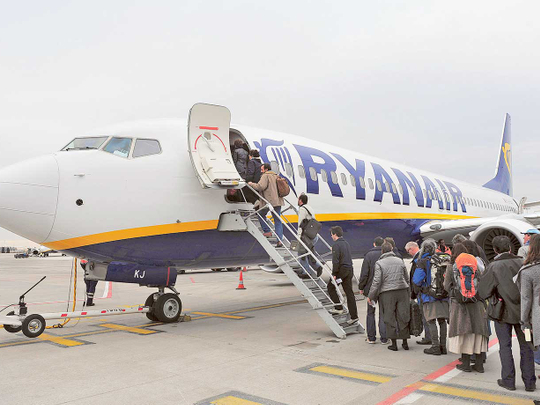
Beauvais: This is “Frexit” country: a small, sleepy French city that embodies the contradictions of the European Union in the aftermath of Brexit’s seismic shift.
As the hub of Ryanair, a major budget airline, Beauvais is recognised mostly because of the cheap, easy travel guaranteed by a borderless continental Europe. But a majority of people living here — ageing, middle class and white — would prefer France joined Britain in bidding adieu to the 28-state bloc.
In a sense, they already have: In 2005, over 60 per cent of people here said no in a referendum on whether France should ratify the European constitution. Some who opposed Europe in that earlier vote, like Jean-Claude Gazon, 73, a retired police officer, say they would absolutely say no again.
“‘France’ means a certain thing,” he said. “De Gaulle made France great, and now. ... Excuse my language, but the country is up to its neck in [expletive].”
Britain’s vote to leave the European Union may have shocked the world, but Euroscepticism was never exclusively British. In fact, more people in France — Europe’s second-largest economy — harbour negative views of the Brussels-based institution than in Britain, according to the results of a comprehensive poll conducted this summer by the Pew Research Centre.
Analysts say a “Frexit” is unlikely, but that Britain’s departure has normalised anti-EU sentiment across the continent to the extent that bowing out of the European Union is no longer a fringe idea. Nowhere is that truer than in France on the eve of a presidential election.
Urgent need
Once espoused mainly by the likes of Marine Le Pen, the fiery leader of France’s far-right National Front party, anti-EU sentiment is so ingrained in public debate here that mainstream politicians — even on the famously pro-European left — are running their campaigns directly against Brussels and its alleged bureaucracy.
Right and left, there is a widespread consensus on the urgent need “to redefine the essence of the European project,” in the words of Arnaud Montebourg, a socialist contender for the nation’s highest office. Le Pen has been saying much the same, albeit in stronger terms, for years.
For Antoine Vauchez, a political scientist at the Sorbonne in Paris, this bizarre convergence represents a shared frustration among French politicians that the European project is no longer dominated by French influence, as it was for decades.
“The way that French political elites used to think of the EU was as a projection of the French model,” he said, referring to the social-welfare policies that France had dictated in Brussels before the bloc began to embrace a free-market orientation in the 1990s.
“Now, there is the feeling that France has little capacity to effectively alter the course of the European Union,” Vauchez said. “The EU is perceived as something more or less ruled in Berlin and Brussels.”
But in Beauvais, disenchantment with Brussels extends beyond the abstract question of French political influence. Here, anti-EU sentiment is personal, driven by the resentment of a promise that has only benefited a lucky few.
Most in Beauvais have never known the Europe frequently romanticised by urban elites and especially by young people: the self-styled utopia of transnational education and cosmopolitan careers. But they are reminded of that Europe every day, through the nearby airport that now serves as one of its unofficial capitals, handling a passenger flow of over 4 million people a year.
Ordinary residents in this pro-Frexit community are quick to point out that they are hardly among the travellers who jet off on Ryanair to Barcelona or Stockholm, either for work or play.
Asked if she had ever lived or worked in another European city — a major selling point frequently invoked by EU advocates — Jacqueline Goget, 70, started laughing. Recently retired from a decades-long career in Beauvais’ city hall, she said that leaving was never an economic possibility for her.
“I’ve lived my whole life in Beauvais,” she said. “I could never have left. There are things that just never came.”
Gazon, the retired police officer, was more explicit, taking direct aim at the frequent travellers who pass through his city. “Young people today are useless — sheltered and depending on their parents,” he said, noting that he, too, was never able to leave Beauvais and survives on a small pension. “I have known misery,” he said. “I have known unemployment.”
This sentiment, for political scientist Dominique Moisi, a co-founder of the Paris-based French Institute for International Relations (IFRI), represents a crucial psychological element in an already fraught political equation.
“The less good you feel about yourself,” he said, “the more you tend to be critical about the Union — that’s absolutely clear. It’s a big problem, because this is a time when candidates should call upon Europe as part of a solution. But they can’t do that because for most Frenchmen, Europe is perceived as part of the problem.”












